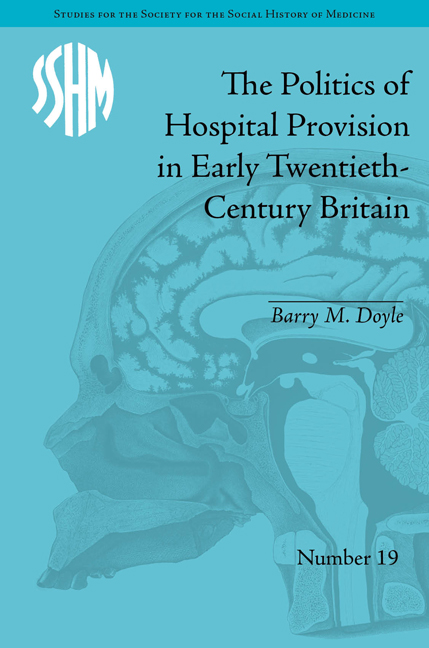Book contents
- Frontmatter
- CONTENTS
- Dedication
- Acknowledgements
- List of Tables
- Introduction
- 1 Leeds and Sheffield: Economic, Social and Political Change
- 2 Hospital Provision: Voluntary and Municipal
- 3 Patients and Access
- 4 Specialization and the Challenges of Modern Medicine
- 5 Finance
- 6 The Politics of Hospital Provision
- 7 Co-operation, Competition and the Development of Hospital Systems
- Conclusion
- Notes
- Works Cited
- Index
7 - Co-operation, Competition and the Development of Hospital Systems
- Frontmatter
- CONTENTS
- Dedication
- Acknowledgements
- List of Tables
- Introduction
- 1 Leeds and Sheffield: Economic, Social and Political Change
- 2 Hospital Provision: Voluntary and Municipal
- 3 Patients and Access
- 4 Specialization and the Challenges of Modern Medicine
- 5 Finance
- 6 The Politics of Hospital Provision
- 7 Co-operation, Competition and the Development of Hospital Systems
- Conclusion
- Notes
- Works Cited
- Index
Summary
By 1929, hospital providers in Leeds and Sheffield had assembled the buildings, the doctors and specialties, the finance and the political structures to deliver a modern hospital service to their cities. However, this process took place without any overarching control, with each hospital or authority free to inaugurate any service they wished or could afford (with some limits on the guardians and the municipality). As we have seen, finance and political will would place limits on development but the existence of a service or specialty in one institution did not preclude it being taken up by another hospital. As a result duplication was common and its potential to multiply was embedded in the 1929 Local Government Act which had encouraged the municipal authorities to take on the delivery of general hospital provision. Yet it is evident that a free-for-all was avoided and the 1930s and 1940s saw the development of integrated services in Leeds and Sheffield. This process saw the large number of independent institutions in the voluntary, poor law and municipal sectors begin to collaborate, merge and reorientate to create increasingly efficient and democratic regional services. The form this co-operation took and the speed and scale were shaped by local economic, social and political cultures and structures responding to internal imperatives and external stimulus from government, national bodies and major crises like the two world wars and the economic depression.
- Type
- Chapter
- Information
- Publisher: Pickering & ChattoFirst published in: 2014



